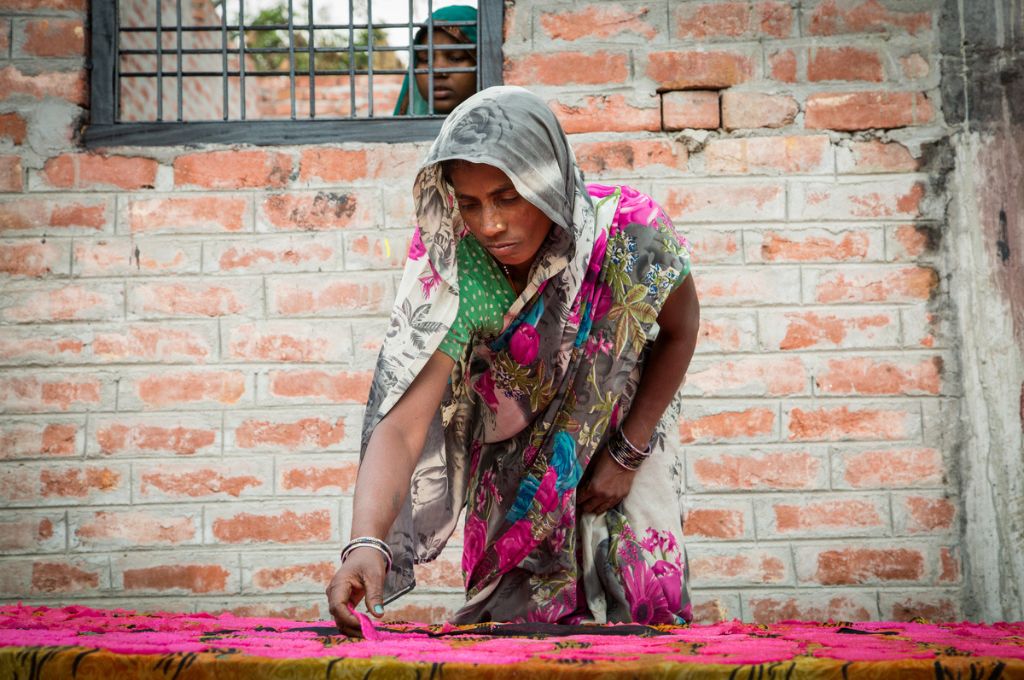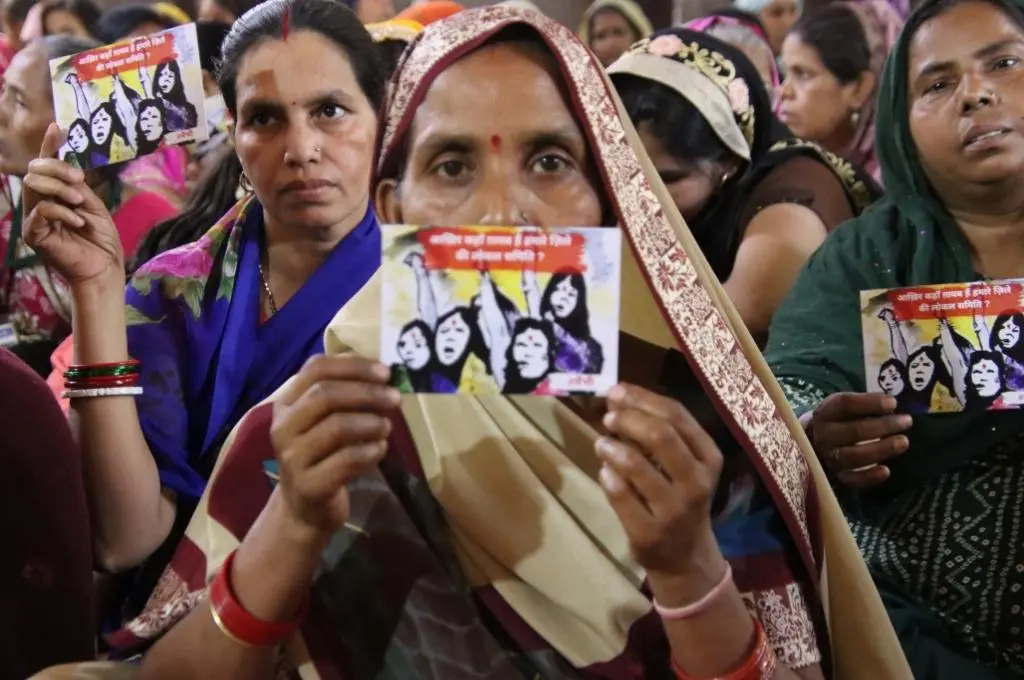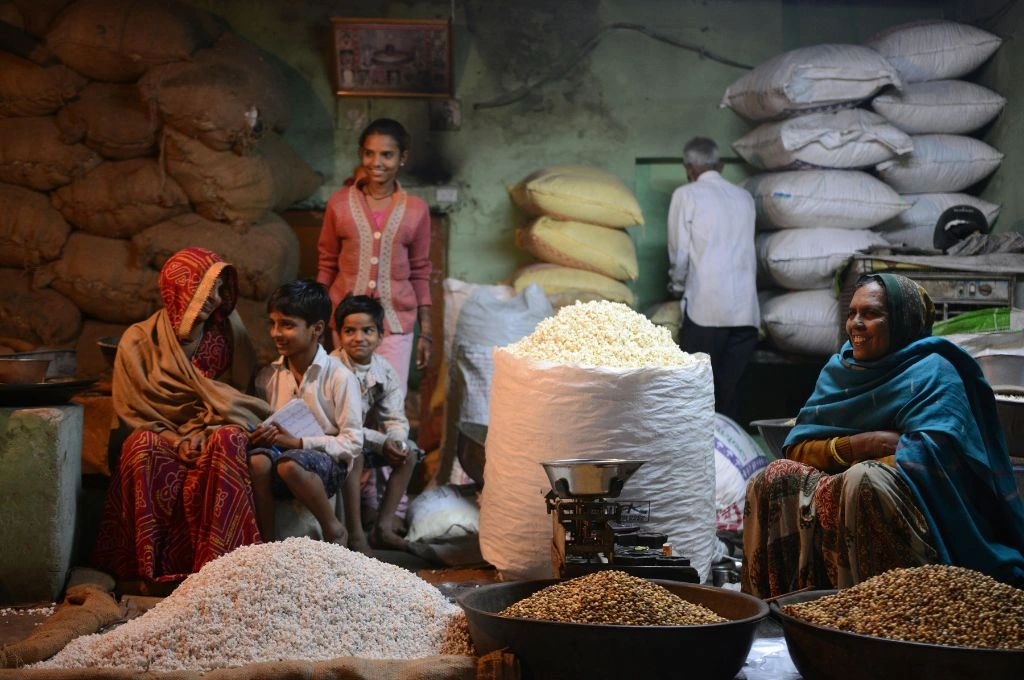Rupali, the daughter of a farmer in Maharashtra’s Satara district, was married off at a very young age. While raising her children, she also helped her husband with his leather manufacturing business. After doing this for several years, she felt a need to start an enterprise of her own, and decided to produce leather-based musical instruments. But without any financial credentials, raising funds became a challenge. She finally managed to secure a loan of INR 20,000 by Mann Deshi Bank, which provides rural women with easy and affordable access to credit.
However, despite now having the capital to start her enterprise, Rupali faced a host of other challenges. She was not proficient in the craft of designing instruments. This meant that while she had the necessary raw materials, she did not have the expertise to execute her business. Additionally, the leather-instruments business is traditionally male dominated, and people around her pressured her to give up on it. Rupali began to worry that she would not be able to repay the loan she was given, and considered reselling the raw material she had bought, and giving up on her dream.
Around that time, she attended a session held by Mann Deshi on running an enterprise. It inspired her to persevere, learn the trade, and improve her business acumen. Her enterprise gradually began to grow, and she was able to secure bigger loans. Today, her enterprise employs 10 women and is capable of supplying 2,000 orders a month.
Rupali’s story is the exception, not the norm. Women entrepreneurs in India face several roadblocks on their path to establishing a viable enterprise. To understand these barriers and learn about possible solutions, Asia Venture Philanthropy Network (AVPN), with support from JP Morgan, organised a roundtable focussed on enabling greater access to finance for women entrepreneurs.
The participants included representatives from non-banking financial companies, corporate foundations, and nonprofits. Drawing from their learnings from their pilot projects and experiences in the field, they offered insights into the interrelated factors that limit women entrepreneurs’ access to finance and how they could be addressed.
1. Managing risk at an institutional and individual level
Financial institutions underwrite loans based on formal financial history and data. Many women in rural and peri-urban areas are unable to provide such data, and are classified as high-risk borrowers as they do not possess assets/collateral against which loans can be underwritten. This prevents them from receiving loans.
To address this, organisations like SEWA Bharat and other nonprofit/cooperatives that work closely with the women in the region provide additional data points to potential lenders. This includes details regarding the woman’s household finances, family dynamics, potential for income generation, etc. According to Manish Thakkar, CEO of Avanti Finance, the informal data points provided by community based organisations enable non-banking financial companies (NBFCs) to feel more confident about the women’s ability to repay the loans and start viewing them as less risky borrowers.
Being part of a collective enterprise also makes space for negotiation with the women’s families.
The entrepreneurs themselves must also grapple with risk. Social norms dictate that their care related responsibilities take precedence over their entrepreneurial functions. As a result, they are likely to establish enterprises that are easier to operate in tandem with their familial duties, but harder to scale. This is evidenced by a recent study commissioned by AVPN and JP Morgan and conducted by the research team at LEAD at Krea University, which indicates that approximately two-thirds of women entrepreneurs in urban and peri-urban areas operate enterprises from within their own homes and earn a median monthly income of less than INR 25,000. Additionally, women who fail in an entrepreneurial endeavour are likely to face immense societal scrutiny. This contributes to making them risk-averse and consequently plateaus the growth of their enterprise.
Dr Akhil Shahani, CEO of the Shahani Group—an education nonprofit—advocated for educational initiatives that would help create of an environment that fosters risk acceptance among women entrepreneurs and their families. SEWA Bharat’s Sanjana Mohanty suggested collectivising women in the form of cooperatives/ producer companies as effective de-risking mechanisms. SEWA has observed that being part of a larger group that collectively runs a venture reduces the financial risk involved for each woman and also creates solidarity for work and towards their vision of economic empowerment. Being part of a collective enterprise also makes space for negotiation with the women’s families, as they are more inclined to allow women to work in such a set up. Lastly, the leadership opportunities in such enterprises provide grassroots women the chance to govern their work better.
It’s also important for external stakeholders to understand the value of patient capital and for MSMEs to plan ahead for the risk of limited working capital and loan repayments. Susan Bhaktul from Industree Foundation, an organisation that provides skilling, and livelihoods, by supporting professional management to assist and handhold artisanal collectives underscores this point. “When we ask a funder (for funding), an expectation on ROI from a funder the very next month is quite challenging. Large companies usually take three years to yield profits and results, so why is an MSME expected to deliver the return within a month?”

2. Capacity building for technical and business skills
As Rupali’s journey demonstrates, women entrepreneurs in urban and peri-urban areas are significantly hindered by a lack of technical, business management, and financial skills. The effects of their capacity-related deficits are further exacerbated by the digital divide. Echoing this sentiment, Sanjana Mohanty says, “Women know their work, and if you work with them and provide them with feedback, they will improve their quality of work; but to improve they need consistent handholding and mentorship to think more strategically for their enterprises.”
Centrally sponsored schemes can serve as a great catalyst for women-led enterprises.
Based on her experiences as the former Deputy Head of RBL Bank’s CSR, Shachi Kaul emphasised the importance of a “forward linkage” beyond simple skilling. She mentioned that when being trained in a trade, women should be allowed to develop “a sensibility that appeals to urban people, because that’s where their market is.” For women entrepreneurs to ultimately succeed, they need to deliver goods/services that meet the certain quality standards, and capacity building initiatives serve as a pathway for ensuring the same. Additionally, producing quality goods will help make their enterprises profitable, and this will allow women entrepreneurs to receive greater funding from CSR organisations, which assess enterprises based on their long-term sustainability.
Helping women entrepreneurs access government schemes by providing them with information regarding relevant ones and training them in bookkeeping and legal compliance is also critical. Centrally sponsored schemes can serve as a great catalyst for women-led enterprises that lack formal funding sources, but they can only avail such schemes if their enterprises are registered and demonstrate good bookkeeping.
3. Access to markets
Providing women entrepreneurs with access to markets where they can sell their products is integral to enabling their success. Providing market linkages helps leverage the skills developed by women entrepreneurs into sustainable revenue. A B Chakravarthy from Upaya Social Ventures highlighted two organisations from their portfolio—Manikstu Agro, which works with goat farmers in Odisha to ensure they receive a fair price for the goats they sell, and Sirohi, which takes products made by women artisans to ecommerce platforms—as examples of how these market linkages are being established in different parts of the country.
The participants also recommend using philanthropic money to bring in highly skilled professionals that can help these enterprises with communications, branding, and other strategic inputs that can help them be viable in the market. Since the increasingly competitive and digital nature of the market may render it a space that rural/peri-urban women entrepreneurs may not be comfortable in, providing them with exposure to industry experts could also help them immensely.
As the participants outlined, tackling the issue of women entrepreneurs’ limited access to finance must take into account the various interrelated factors that hinder it. A strategy for sustainable growth must provide them access to finance as well as solutions that address their capacity building and market related challenges.
By sharing innovative solutions based on their experiences in the field, the participants provided a blueprint for enabling such change. Although there is still much work to be done, philanthropic collaboration that pools the funds and expertise of a diverse set of funders can address the gaps in present interventions and enable the sustainable transformation of women’s entrepreneurship in rural and peri-urban India.
*All quotes in this article from a session titled ‘Enabling greater Access to finance for women owned small scale enterprises’ at AVPN’s South Asia Social Investment Summit 2023
—






